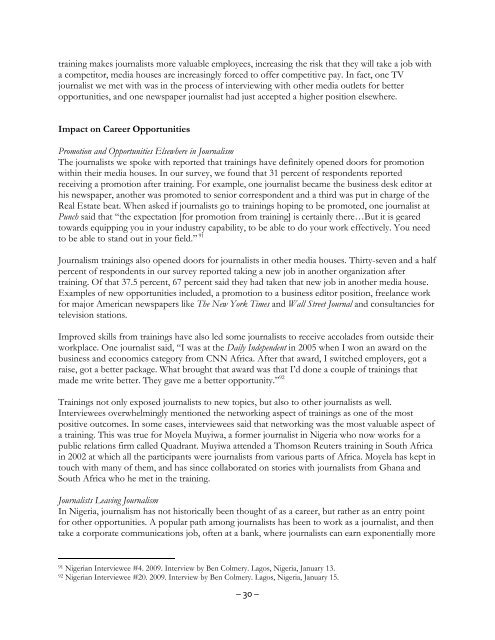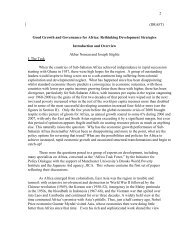training makes journalists more valuable employees, increasing the risk that they will take a job witha competitor, media houses are increasingly <strong>for</strong>ced to offer competitive pay. In fact, one TVjournalist we met with was in the process of interviewing with other media outlets <strong>for</strong> betteropportunities, and one newspaper journalist had just accepted a higher position elsewhere.Impact on Career OpportunitiesPromotion and Opportunities Elsewhere in JournalismThe journalists we spoke with reported that trainings have definitely opened doors <strong>for</strong> promotionwithin their media houses. In our survey, we found that 31 percent of respondents reportedreceiving a promotion after training. For example, one journalist became the business desk editor athis newspaper, another was promoted to senior correspondent and a third was put in charge of theReal Estate beat. When asked if journalists go to trainings hoping to be promoted, one journalist atPunch said that “the expectation [<strong>for</strong> promotion from training] is certainly there…But it is gearedtowards equipping you in your industry capability, to be able to do your work effectively. You needto be able to stand out in your field.” 91Journalism trainings also opened doors <strong>for</strong> journalists in other media houses. Thirty-seven and a halfpercent of respondents in our survey reported taking a new job in another organization aftertraining. Of that 37.5 percent, 67 percent said they had taken that new job in another media house.Examples of new opportunities included, a promotion to a business editor position, freelance work<strong>for</strong> major American newspapers like The New York Times and Wall Street Journal and consultancies <strong>for</strong>television stations.Improved skills from trainings have also led some journalists to receive accolades from outside theirworkplace. One journalist said, “I was at the Daily Independent in 2005 when I won an award on thebusiness and economics category from CNN Africa. After that award, I switched employers, got araise, got a better package. What brought that award was that I’d done a couple of trainings thatmade me write better. They gave me a better opportunity.” 92Trainings not only exposed journalists to new topics, but also to other journalists as well.Interviewees overwhelmingly mentioned the networking aspect of trainings as one of the mostpositive outcomes. In some cases, interviewees said that networking was the most valuable aspect ofa training. This was true <strong>for</strong> Moyela Muyiwa, a <strong>for</strong>mer journalist in Nigeria who now works <strong>for</strong> apublic relations firm called Quadrant. Muyiwa attended a Thomson Reuters training in South Africain 2002 at which all the participants were journalists from various parts of Africa. Moyela has kept intouch with many of them, and has since collaborated on stories with journalists from Ghana andSouth Africa who he met in the training.Journalists Leaving JournalismIn Nigeria, journalism has not historically been thought of as a career, but rather as an entry point<strong>for</strong> other opportunities. A popular path among journalists has been to work as a journalist, and thentake a corporate communications job, often at a bank, where journalists can earn exponentially more91 Nigerian Interviewee #4. 2009. Interview by Ben Colmery. Lagos, Nigeria, January 13.92 Nigerian Interviewee #20. 2009. Interview by Ben Colmery. Lagos, Nigeria, January 15.– 30 –
money. Their knowledge of what media are looking <strong>for</strong> in terms of content, and their mediacontacts, make journalists uniquely suited to these communications positions.A major concern about journalism training is whether or not it increases the likelihood <strong>for</strong>journalists to leave the field altogether to seek other opportunities, threatening to actually lower theoverall quality of journalism from “brain drain.” Professor Utomi estimated that 90 percent of thejournalists he has trained have been recruited to work in corporate communications. 93 Theknowledge journalists receive in business reporting trainings often supplements education they didnot have access to in university, and qualifies them to work in positions outside of journalism thatare considerably more lucrative. In fact, many of our sample journalists have fled to other industries,while others are currently working outside of journalism.Dean Emevmo Biakolo of School of Media and Communication admitted that there are manyjournalists who are leaving the profession, but that this is more a function of low pay than training. 94In our survey, we found that 77.5 percent of our respondents reported that they remained injournalism after training, which supports this claim.Many journalists we interviewed had left the profession <strong>for</strong> a time, often seeking better pay, butreturned to journalism later. “I’ve heard stories from some of our colleagues who left to the banks,”said a journalist with Punch. But after some time they have not derived the kind of satisfaction theyexpected, and they are back to the newsroom. “Yes, they say, ‘We were being paid more than wewere getting from the media. But we don’t have the job satisfaction that we used to have.’” 95 Hesaid he saw this happen with at least two journalists when he was working at the Daily Independent. A<strong>for</strong>mer journalist who is now working in corporate communications at PHB Bank wanted to see theother side of his industry, and thought it would be good <strong>for</strong> him to go into public relations (citinghigher pay as the second reason). 96 Despite working a day job in Public Relations, he continues topublish stories in newspapers under a pen name. His hope is to return to journalism in the future inan ownership role.A <strong>for</strong>mer senior correspondent with This Day said that he has only left the journalism profession <strong>for</strong>the time being. “I wouldn’t say I have left journalism. I know I will return to journalism. I am certainof it. I know that I feel that I would lose a part of myself if I don’t practice journalism. Journalism isa profession that people go into because it gives you power.” 97 He reported that the opportunity toleave arose because of the trainings he’s had, certainly but that he left primarily because he wanted togain corporate experience. This journalist said he plans to return to journalism in six months or ayear. “When you practice journalism <strong>for</strong> a while and leave journalism,” he said, “and you go work<strong>for</strong> the government, or the private sector, and other work that aligns with the skills of journalists,you will always want to go back. Journalism is one work that seeps into your system. You cannot sitdown and not want to write, or pursue a story. As a journalist or <strong>for</strong>mer journalist you see all that ishappening around you, and you want to break that story today. When you leave mainstreamjournalism, you lose the chance to tell stories the way you want them to be told.”93 Patrick Utomi. 2009. Interview by Adriana Diaz. Lagos, Nigeria, January 15.94 Emevmo Biakolo. 2009. Interview by Ben Colmery. Lagos, Nigeria, January 14.95 Nigerian Interviewee #4. 2009. Interview by Ben Colmery. Lagos, Nigeria, January 13.96 Nigerian Interviewee #5. 2009. Interview by Ben Colmery and Adriana Diaz. Lagos, Nigeria, January 12.97 Nigerian Interviewee #20. 2009. Interview by Ben Colmery. Lagos, Nigeria, January 15.– 31 –
- Page 1 and 2: THEREWILLBE INKA study of journalis
- Page 3 and 4: AcknowledgementsThis paper has bene
- Page 7 and 8: Executive SummaryPurpose of the Rep
- Page 9 and 10: journalists in these countries that
- Page 11 and 12: Existing International Training Opp
- Page 13 and 14: • Consumer Affairs and Informatio
- Page 15 and 16: Background 3Of the three countries
- Page 17 and 18: pervasive conflict in the Niger Del
- Page 19 and 20: 3) Crises or disruptions, where som
- Page 21 and 22: Low pay and low regardOne of the mo
- Page 23 and 24: Even in cases where working journal
- Page 25 and 26: But while some reporters think FOIB
- Page 27 and 28: When asked how much the media could
- Page 29 and 30: the effects of these challenges for
- Page 31 and 32: detailed analysis of the opportunit
- Page 33 and 34: journalist said he has, however,
- Page 35: completely make use of some of the
- Page 39 and 40: Notes on conducting research in Nig
- Page 41 and 42: Ghana- 35 -
- Page 43 and 44: evenues each year,” 106 which wou
- Page 45 and 46: entertainment news, scandals, and p
- Page 47 and 48: The rise of business-focused journa
- Page 49 and 50: coverage of the oil industry is als
- Page 51 and 52: needed supplementary income to cash
- Page 53 and 54: as supporting one political party o
- Page 55 and 56: Numerous journalists recounted how
- Page 57 and 58: Training programs available to busi
- Page 59 and 60: Amos Safo, editor-in-chief at the p
- Page 61 and 62: Notes on conducting research in Gha
- Page 63 and 64: Background 136Literacy and Educatio
- Page 65 and 66: “sufficient information” about
- Page 67 and 68: or criminal charges for content the
- Page 69 and 70: have such difficulty obtaining info
- Page 71 and 72: The majority of those interviewed b
- Page 73 and 74: commitment to their profession and
- Page 75 and 76: Notes on Conducting Research in Uga
- Page 77 and 78: Recommendations for Revenue Watch I
- Page 79 and 80: people who have no journalism backg
- Page 81 and 82: analyzes business,” he said, “e
- Page 83 and 84: A journalist with The Punch said,
- Page 85 and 86: The Media Foundation for West Afric
- Page 87 and 88:
Length of TrainingRoughly three-qua
- Page 89 and 90:
industries, for instance, ought to
- Page 91 and 92:
otherwise being published in the pr
- Page 93 and 94:
Non-Training Recommendations for Ug
- Page 95 and 96:
Appendix A: NigeriaPotential Partne
- Page 97 and 98:
journalists. Biakolo is very profes
- Page 99 and 100:
Television Stations• Nigerian Tel
- Page 101 and 102:
have two to four month professional
- Page 103 and 104:
City: AccraTelephone: +233 (021) 22
- Page 105 and 106:
Fax: +256 414 255 495E-mail: umdf@a
- Page 107 and 108:
• What do you think are the most
- Page 109 and 110:
Appendix E: Survey Questions1. Name
- Page 111 and 112:
18. How effective were the teaching
- Page 113 and 114:
28. What are the most important cha
- Page 115 and 116:
1. Journalists by Country2. How wou
- Page 117 and 118:
5. How often do you travel out of t
- Page 119 and 120:
9. Which organization(s) sponsored
- Page 121:
12. After completing the training(s














